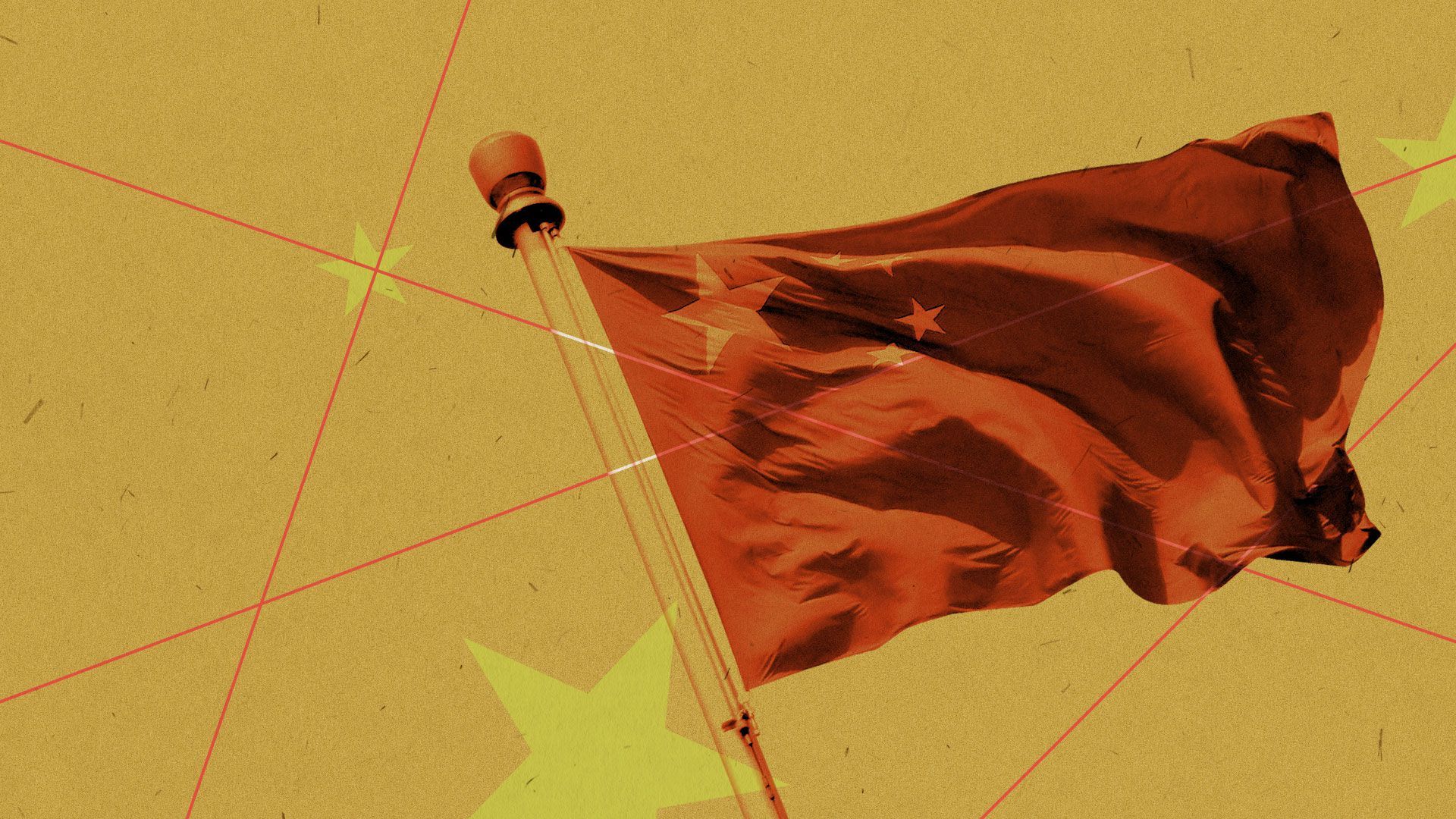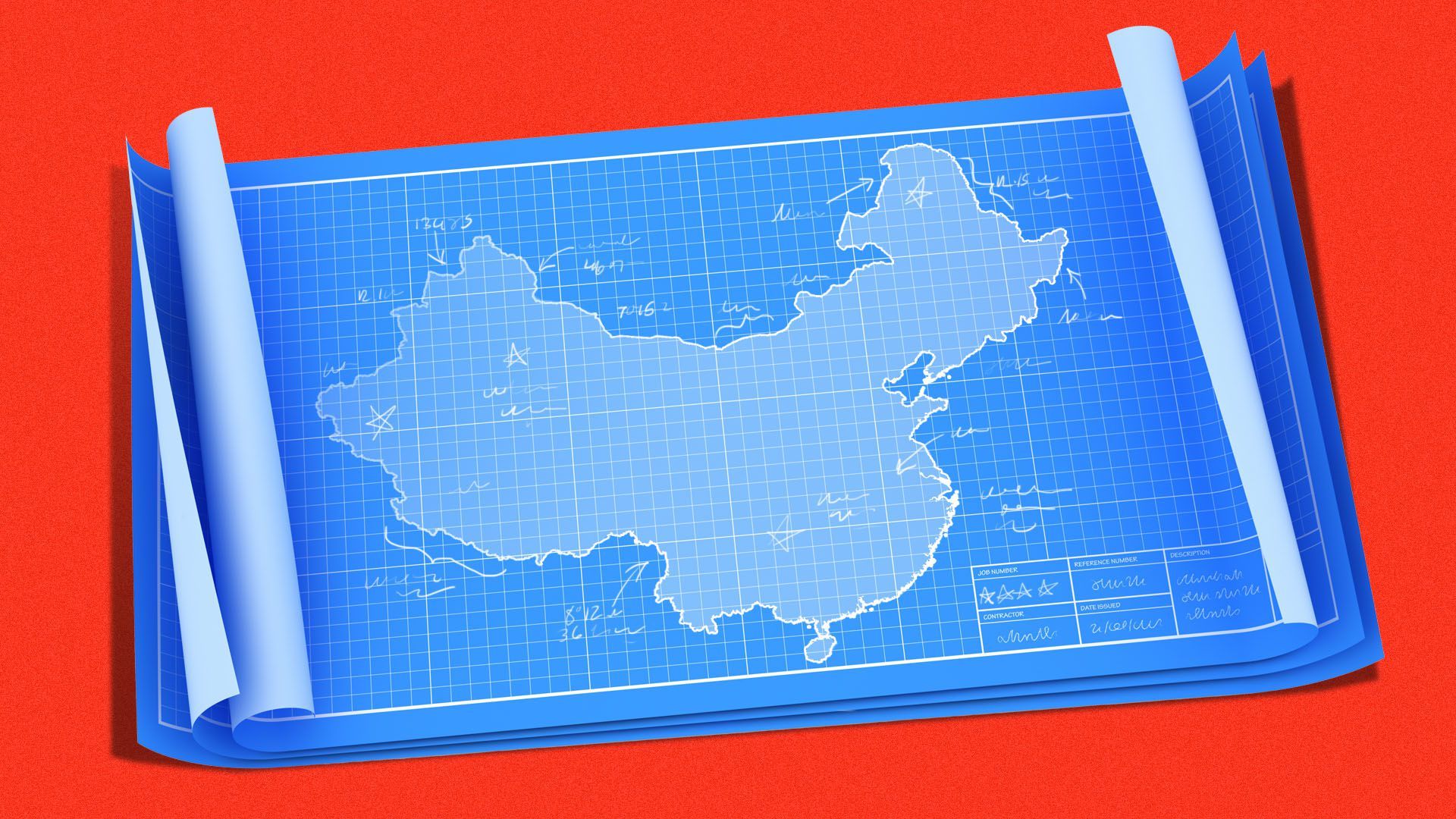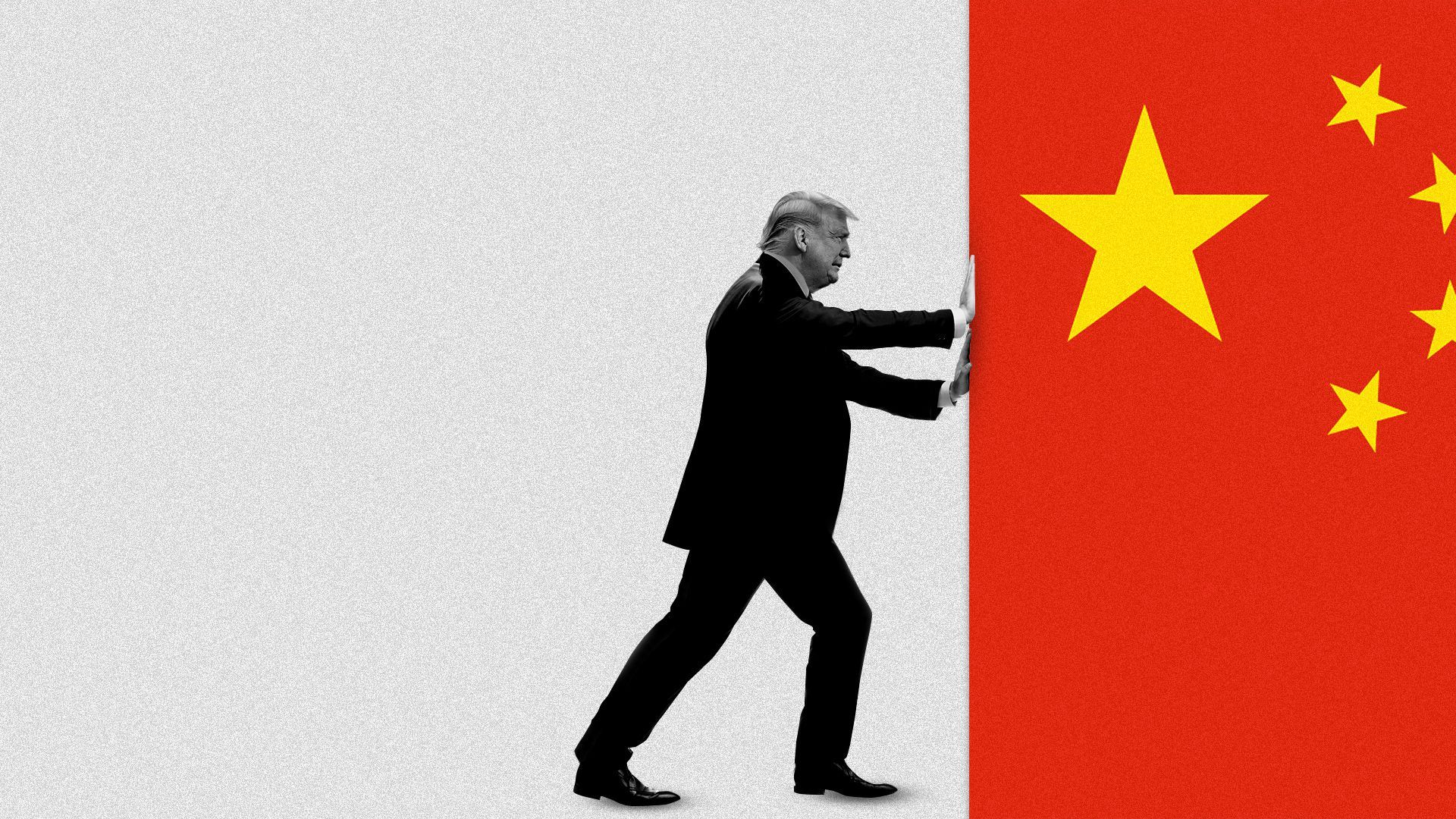| | | | | | | Presented By Bright Cellars | | | | Axios China | | By Bethany Allen-Ebrahimian ·Nov 17, 2020 | | Welcome back to Axios China. Today we've got Biden's Day 1 China challenges, the State Department's final message on China, a new trade bloc and lots more. - 🎧 I spoke with Niala Boodhoo, the host of our daily news podcast "Axios Today," about the Trump administration's final push against China. Listen here.
Today's newsletter is 1,424 words, a 5-minute read. | | | | | | 1 big thing: The China challenges Biden must address on Day 1 |  | | | Illustration: Eniola Odetunde/Axios | | | | The day he enters the White House, President-elect Joe Biden will inherit a host of China-related challenges that require immediate action, from restoring diplomatic backchannels with China to figuring out what to do about lingering tariffs. The big picture: Biden must find a way to put the U.S.-China relationship on a more sustainable path while preserving U.S. national security interests and blocking China's efforts to weaken international norms. Backstory: During President Trump's last year in office, the administration reshaped the U.S.-China relationship, taking 159 China-related policy actions in 2020 alone, according to a White House list obtained by Axios. - Some of those actions have been criticized as counterproductive and damaging to U.S. values, such as restrictions placed on Chinese journalists and the U.S. withdrawal from the World Health Organization, in part due to China's influence over the organization.
What's next: The Biden administration will likely move quickly to unwind Trump-era actions seen as dangerous or immediately harmful. Reengagement: This could mean rejoining multilateral organizations, including the WHO, and pursuing limited cooperation with China on pandemic management and climate change. Those moves may include: - Staffing the Center for Disease Control and Prevention office in Beijing. The Trump administration removed most personnel in the months prior to the coronavirus pandemic.
- Rejoining the U.N. Human Rights Council to push back against China's attempts to water down international human rights norms amid its ongoing cultural genocide against Muslim minorities. Trump withdrew the U.S. from the council in 2018 after claiming it demonstrated anti-Israel bias.
Restoring diplomacy: Look for Biden to overhaul the State Department and attempt to improve communication with Chinese counterparts. Under Trump, high-level diplomatic communications and backchannels were hollowed out, increasing the risk of miscommunication and miscalculation should a true crisis occur. Revamping the Department of Justice's China Initiative to better protect the civil rights of Chinese Americans. - "The U.S. government should restart and expand anti-bias trainings to make investigators and prosecutors more conscious of factors in their own decision-making," said Margaret Lewis, a law professor at Seton Hall University School of Law.
- Lewis also recommends an actor-agnostic approach to federal investigations, rather than lumping cases together under the "China" label.
Removing restrictions on Chinese journalists in the U.S., and working with Chinese counterparts to restore U.S. journalist access to China. - Earlier this year, the State Department imposed strict limits on visas for some Chinese nationals in the U.S. on journalist visas, putting many journalists in permanent limbo.
- Beijing retaliated by expelling over a dozen U.S. correspondents from China, reducing global visibility into China at a critical time. Beijing said its actions were based on reciprocity; it may relent if Chinese journalists in the U.S. no longer face restrictions.
What to watch: Biden's approach to Taiwan. The China-Taiwan relationship sits at a riskier juncture than it has in years, due to Beijing's harder line on Taiwanese sovereignty and Taiwan's own growing identity as an independent nation. - Republicans have recently floated the idea of a U.S.-Taiwan free trade agreement, but that did not materialize during the Trump administration. Some experts close to the Biden campaign have praised this idea as well.
Go deeper: |     | | | | | | 2. Scoop: State Department to release blueprint for response to China |  | | | Illustration: Sarah Grillo/Axios | | | | The U.S. State Department's Office of Policy Planning is set to release a blueprint for America's response to China's rise as an authoritarian superpower, Axios has learned. Why it matters: The lengthy document calls for strong alliances and rejuvenation of constitutional democracy. Axios obtained a copy. - The unclassified paper, called "The Elements of the China Challenge," draws inspiration from an influential article published in 1947 by the policy planning team's founder, U.S. diplomat George Kennan, in which he introduced the idea of containment as a strategy to deal with the Soviet Union.
Details: The document, which is more than 70 pages long, examines the Chinese Communist Party's harmful conduct and its ideological sources, the vulnerabilities China faces, and how the U.S. and its allies should respond. - "Meeting the China challenge requires the United States to return to the fundamentals," the paper states. The U.S. must fashion "sturdy policies that stand above bureaucratic squabbles and interagency turf battles and transcend short-term election cycles. The United States' overarching aim should be to secure freedom."
The paper lays out "ten tasks" for the U.S. to accomplish, including: - Promoting constitutional government and civil society at home.
- Maintaining the world's strongest military.
- Strengthening the alliance system and creating new international organizations to promote democracy and human rights.
- Training a new generation of public servants who understand great-power competition with China.
Between the lines: The paper rejects the unilateralism and isolationism of the Trump era while maintaining conservative undertones, including an emphasis on economic liberty and a strong military. Expert take: "One unique feature of the memo is its focus on how the CCP's worldview shapes its behavior, which has been rare in U.S. government documents and should be a larger part of U.S. policy debates," said Rush Doshi, director of the Brookings China Strategy Initiative, who reviewed a copy. - But the paper mostly overlooks certain key topics, including allied industrial policy, cross-border data flows and new tech coalitions, said Doshi. And "economics and technology are at the center of U.S.-China competition, but they barely appear in the memo's prescriptions," he added.
Of note: The arguments contained in the paper contrast sharply with those of Kiron Skinner, former director for policy planning at the State Department, who initially led the effort to formulate what she described as a China-focused Kennan-style paper. - Skinner faced intense criticism after claiming in April 2019 that China's rise was "a fight with a really different civilization" and "the first time that we will have a great power competitor that is not Caucasian." She left the State Department a few months later.
- The document obtained by Axios states pointedly on the first page that "China is a challenge because of its conduct." It does not cast great-power competition in civilizational or racial terms.
Go deeper: Read the paper. |     | | | | | | 3. Map: China and Asia-Pacific nations form free trade bloc |  Map: Danielle Alberti/Axios On Nov. 15, China and 14 other countries in the Asia-Pacific region officially formed the Regional Comprehensive Economic Partnership, now the world's biggest free trading bloc, accounting for almost a third of all economic activity. Why it matters: "For the first time in living memory, the hegemon at the center of a major global free trade agreement is not the U.S.," Axios' Felix Salmon writes. |     | | | | | | A message from Bright Cellars | | This wine is made for your palate | | |  | | | | Discover your wine experience with Bright Cellars – a monthly wine club that matches you with wine that you'll love. To get started, take their quiz and get matched with wine specifically for your taste. Order today and get $45 off your first box of 6 personalized bottles of wine and tasting cards. | | | | | | 4. Catch up quick | | 1. China congratulated Biden and Harris on their election victory, after several days' delay. Go deeper. 2. Xi Jinping personally halted Jack Ma's Ant IPO, the Wall Street Journal reports. 3. The Hong Kong government ousted four pro-democracy lawmakers, citing unspecified national security concerns. Go deeper. 4. Taiwan was blocked from an important World Health Organization meeting for the second time this year, Al Jazeera reports. 5. President Trump barred American investment in 31 Chinese companies previously listed as working with the Chinese military. Go deeper. |     | | | | | | 5. Trump plans last-minute China crackdown |  | | | Illustration: Aïda Amer/Axios | | | | President Trump will enact a series of hardline policies during his final 10 weeks in office to cement his legacy on China, according to senior administration officials with direct knowledge of the plans, my colleague Jonathan Swan and I report. Why it matters: Trump will try to make it politically untenable for the Biden administration to change course as China acts aggressively from India to Hong Kong to Taiwan, and the pandemic triggers a second global wave of shutdowns. - Watch for National Intelligence Director John Ratcliffe to publicly describe in granular detail intelligence about China's nefarious actions inside the U.S.
Details: Trump officials plan to sanction or restrict trade with more Chinese companies, government entities and officials for alleged complicity in human rights violations in Xinjiang and Hong Kong, or threatening U.S. national security. - Officials plan to target China's growing use of forced labor in the highly competitive fishing industry. Coerced and unpaid labor isn't just a human rights concern — it can also give Chinese fisheries an advantage over rivals in an industry with geopolitical significance.
- But don't expect big new moves on Taiwan or more closures of Chinese consulates in the U.S., officials say.
Read the full story. |     | | | | | | 6. What I'm reading: China charms Pacific Island countries |  | | | Illustration: Eniola Odetunde/Axios | | | | China is using economic and diplomatic incentives to strengthen its sway over Pacific Island nations, a new report finds. Why it matters: Beijing's charm campaign in the Pacific aims to further isolate Taiwan and expand China's maritime reach. Details: A new report from open source intelligence firm Babel Street finds China is offering generous aid and infrastructure packages to island nations across the Pacific. - Some of these projects, such as a major wharf project in Vanuatu, could potentially have dual military-civilian use, creating the potential of expanded reach of the People's Liberation Army Navy.
- Another goal is to squeeze Taiwan. Four of Taiwan's 15 remaining diplomatic allies are Pacific Island nations. Prior to September 2019, there were six, but Beijing poached two of them — Kiribati and the Solomon Islands. That leaves Nauru, Palau, the Marshall Islands and Tuvalu.
What they're saying: "While leaders in these countries see strategic benefit and leverage through deepening relations with the PRC, they must also consider what China hopes to gain through their engagement because the actions on these small islands could have outsized effects," write the report's authors. Read the report. |     | | | | | | A message from Bright Cellars | | This wine is made for your palate | | |  | | | | Discover your wine experience with Bright Cellars – a monthly wine club that matches you with wine that you'll love. To get started, take their quiz and get matched with wine specifically for your taste. Order today and get $45 off your first box of 6 personalized bottles of wine and tasting cards. | | | | | | Axios thanks our partners for supporting our newsletters.
Sponsorship has no influence on editorial content. Axios, 3100 Clarendon Blvd, Suite 1300, Arlington VA 22201 | | | You received this email because you signed up for newsletters from Axios.
Change your preferences or unsubscribe here. | | | Was this email forwarded to you?
Sign up now to get Axios in your inbox. | | | | Follow Axios on social media:    | | | | | |








No comments:
Post a Comment